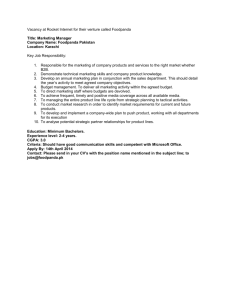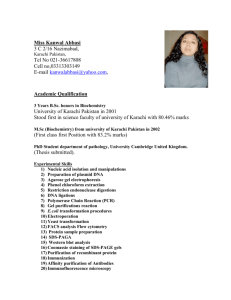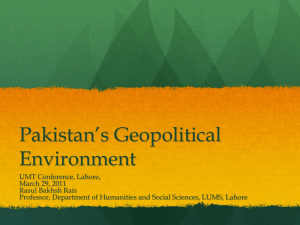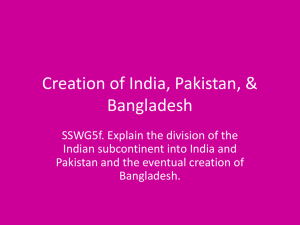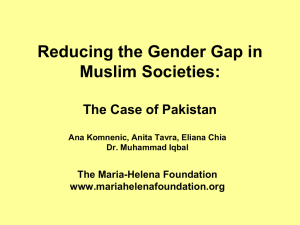Gender & Higher Education Leadership
advertisement
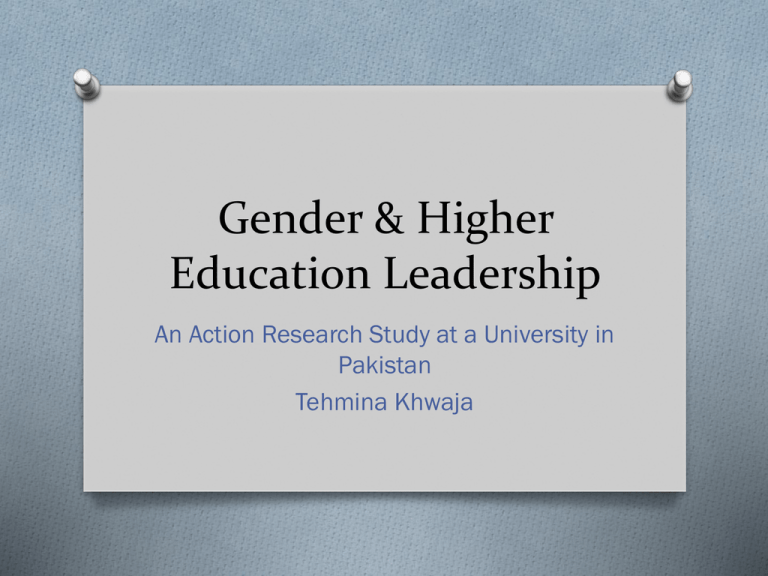
Gender & Higher Education Leadership An Action Research Study at a University in Pakistan Tehmina Khwaja Topic Statement O This study explores the participation of women in higher education leadership in Pakistan to find out why there are so few women in leadership positions. The purpose of the study is to understand what factors hinder women’s participation in leadership and how to improve the situation. Sociological and Theoretical Framework O The economic, social, and cultural capital theory of Pierre Bourdieu, and O Conflict theory attributed to Karl Marx (Sadovnik, 2011) Literature O Conservative society with deep gender inequalities (Ali & Knox, 2008; Ali et al., 2011) O Family background, economic and cultural capital important factors (Bashiruddin, 2007; Rashid, 2010) O Unequal distribution of household and childcare responsibilities hinder women’s advancement (Madhani, 2007; Rerieya, 2007) Key Findings O Women face cultural barriers in a male dominated society with scarce resources. O Women who attain leadership positions do so with familial, particularly paternal support. O Economic, cultural, and social capital can overcome cultural barriers. O Any reform initiative must include men. Research Plans O Mixed methods quantitative/qualitative O Survey and interview data O The project will be carried out at a small private university in Islamabad, Pakistan References Ali, F., & Knox, A. (2008). Pakistan’s commitment to equal employment opportunity for women: A toothless tiger? International Journal of Employment Studies, 16(1), 39-58. Ali, T. S., Krantz, G., Gul, R., Asad, N., Johansson, E., & Mogren, I. (2011). Gender roles and their influence on life prospects for women in urban Karachi, Pakistan: A qualitative study. Global Health Action, 4, 7448, 1-9, doi:10.3402/gha.v4i0.7448. Bashiruddin, A. (2007). Becoming a teacher educator: A female perspective. In R. Qureshi & J. F. A. Rerieya (Eds.), Gender and education in Pakistan (pp. 43-59). Karachi, Pakistan: Oxford University Press. Madhani, N. (2007). Career development in management at a Pakistani university: Is Gender a factor? In R. Qureshi & J. F. A. Rerieya (Eds.), Gender and education in Pakistan (216-236). Karachi, Pakistan: Oxford University Press. Rashid, N. (2010). Women differences in seeking educational leadership and management. Journal of Educational Research, 13(1), 207-224. Rerieya, J. F. A. (2007). Women in leadership: Negotiating the labyrinth. In R. Qureshi & J. F. A. Rerieya (Eds.), Gender and education in Pakistan (196-215). Karachi, Pakistan: Oxford University Press. Sadovnik, A. (2011). Sociology of Education: a critical reader, 2nd ed. (pp. 3-21). New York: Routledge.
